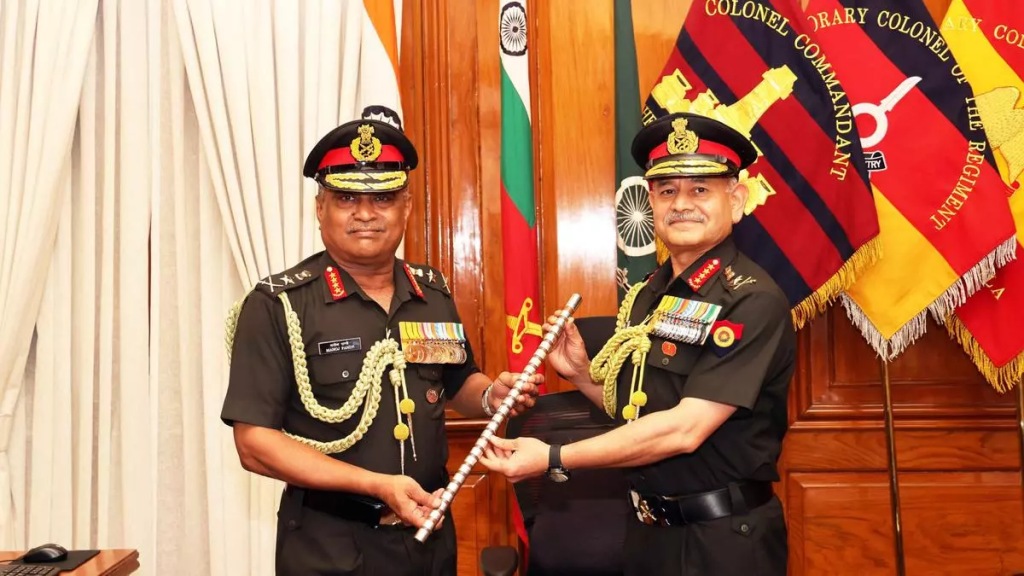By Farooq Wani
A little over three years ago, a report by the US-based Stimson Center, a leading foreign affairs think tank, concluded that the Indian Army “remains resource-constrained, overstretched, and vulnerable to a two-front threat…” This peculiar situation of a collusive Sino-Pak threat both against external belligerence as well as fomenting internal unrest through proxies actually makes it (in the words of former CDS Gen Bipin Rawat) a two-and-a-half front threat, making the overall situation extremely complex and equally serious.
So, while Gen Upendra Dwivedi who has taken over as the 30th Chief of Army Staff of the Indian Army has an extremely challenging task before him, his vast experience in dealing with such threats will surely prove to be an asset.
India’s relations with both Pakistan and China aren’t the best at present. Relations with Pakistan are stalemated and have not moved forward at all since May 2014, when then Prime Minister Nawaz Sharif attended the swearing-in ceremony of Narendra Modi’s first term as Indian prime minister. In the decade that has passed, India has had to face and firmly counter Islamabad’s continuing tryst with terrorism. It has been a formidable challenge that has been met with a firm and appropriate response.
To Islamabad’s dismay, New Delhi has achieved outstanding success in changing the security, socio-economic and administrative narrative in J&K, and was made possible because of two factors. Firstly, abrogation of Article 370 in 2019 that had under the garb of ‘special status’ prevented various people oriented programmes and initiatives from being applicable to the people of J&K for 65 years.
Secondly, near perfect coordination and synergy between various security and intelligence agencies has facilitated effective neutralisation of terrorists and dismantling terrorist infrastructure. However, since Islamabad continues to use terrorism as a foreign policy tool, its efforts to create unrest in J&K continue unabated as is evident from the recent spate of terrorist attacks in the Jammu region.
India has twin concerns about China. First, concerns Beijing’s continuing attempts to grab Indian Territory in Ladakh and Arunachal Pradesh, and second is the increased visible cooperation and support that exists between Pakistan and China especially in the military field. While the first concern has been militarily addressed firmly by India much to China’s surprise and has included the strategic repositioning of mountain divisions and Special Forces, the second concern dominates political, diplomatic and economic discourse more now than ever before.
India is certainly no longer enthused by the “India-Chini Bhai Bhai” slogan of the 1950s and early 1960s. It is intelligently aware of changing geopolitical dynamics and the new post-covid churning world order, leading it to constantly and consistently recalibrate policy and engagement to suit its needs.
India’s security and defence planning also necessitates that our actions in the north and west remain well coordinated to offset threats by China’s continuing economic cooperation with Islamabad and its repressive policies in Pakistan occupied J&K.
It is in this context that the elevation of Upendra Dwivedi as COAS is a pivotal moment for India’s defence landscape. General Dwivedi has an illustrious background. He has been the Vice Chief of Army Staff, GoC-in-C of the Indian Army’s Northern Command that deals with the challenges in J&K.
When it comes to experience on north east matters, he has served as the Inspector General of Assam Rifles as a Major General; he has been an Assam Rifles Sector Commander in the rank of a Brigadier. In both of these tenures in the Assam Rifles, he played a crucial role in intensifying counter-terrorism operations. He has also held several key staff command appointments in the North East. The first-ever moves on management of the Indo-Myanmar border were initiated under his leadership.
Modernising and equipping the Indian Army with indigenous equipment as part of the Atmanirbhar Bharat initiative and his deep understanding of the J&K and North East Indian terrain positions him to enhance and enforce the Army’s strategic postures in these two sensitive regions.
It can be expected that under his leadership, the Indian Army will implement its operations with surgical precision to minimise collateral damage, neutralise the two-front threat from both Pakistan and China, and maintain support for people in J&K and the North East.
A renewed focus on technological integration and modernisation of the forces deployed in J&K to maintain a tactical edge over adversaries and a nuanced approach to civil-military relations is likely to strengthen the bond between the armed forces and the locals in J&K. Winning hearts and minds through developmental initiatives and community engagement will ensure a more stable and cooperative environment.
On the geopolitical front, his attempts will be to enhance India’s strategic deterrence against external threats and the bottom line is that the Indian Army has to remain vigilant and prepared to counter any aggression that could in any way compromise the nation’s sovereignty and territorial integrity.
General Dwivedi’s experience as an army officer of more than 40 years standing promises India a robust and resilient defence posture.
The author is Editor Brighter Kashmir, Author, TV commentator, political analyst and columnist.
Disclaimer: Views expressed are personal and do not reflect the official position or policy of FinancialExpress,com Reproducing this content without permission is prohibited.

